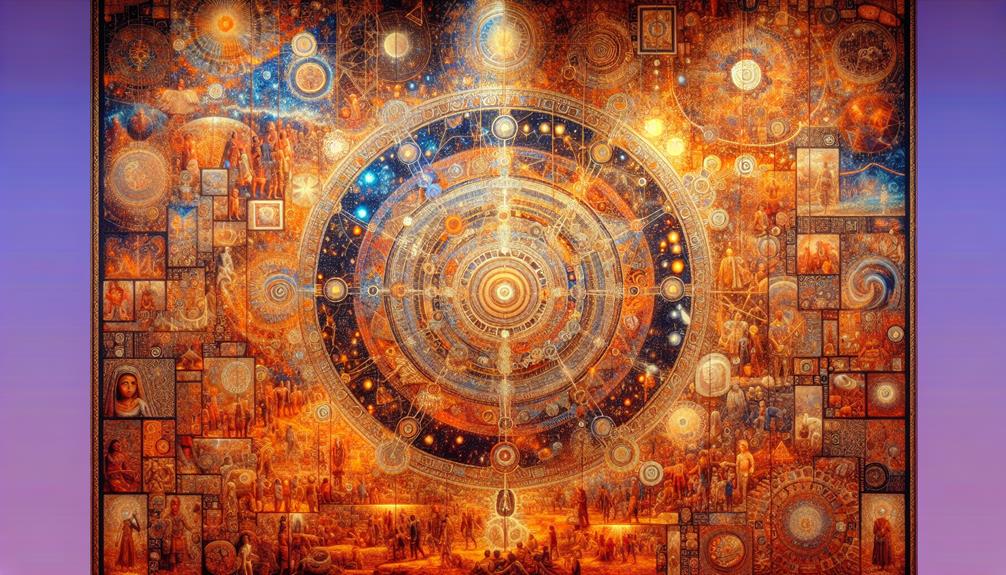As you explore the intricate tapestry of ancient rituals, you’ll uncover how these practices not only defined civilizations but also shaped their core beliefs. Each rhythmic ceremony and sacred space invites you to witness the profound connection between humanity and nature, revealing insights that resonate even today. You might find yourself pondering how these time-honored traditions influence modern values and sustainability efforts. What if you could trace the heartbeat of these ancient customs into our contemporary lives? The answers may surprise you, opening a door to a richer understanding of your own cultural heritage.

Ancient Rituals and Practices
Ancient rituals and practices reveal a profound connection between communities and their beliefs, immersing you in the vibrant tapestry of their cultural heritage.
As you investigate these time-honored traditions, you’ll discover the significance of ceremonies that mark life’s milestones—births, marriages, and deaths. Each rite is infused with meaning, often steeped in ancestral wisdom and communal values.
You’ll encounter the rhythmic beats of drums during harvest festivals, where communities celebrate abundance and give thanks to deities. Witness the mesmerizing dances that narrate stories of creation, embodying the spirits of nature and ancestors. These performances aren’t just entertainment; they’re expressions of identity and continuity, binding generations together.
You’ll also explore the sacred spaces where rituals unfold, from ancient temples to natural sites revered for their spiritual essence. The use of symbols, offerings, and chants in these practices serves to invoke divine presence and foster a sense of unity among participants.
Engaging with these rituals allows you to appreciate the intricate relationship between culture and spirituality, revealing how deeply rooted traditions continue to shape community life today.
Beliefs That Shaped Civilizations
How did the core beliefs of different societies influence their development and interactions throughout history?
You’ll find that these beliefs acted like a compass, guiding civilizations through challenges and shaping their identities. For instance, the ancient Egyptians believed in a pantheon of gods, which fostered a culture rich in monumental architecture and intricate rituals. This belief system didn’t just dictate Personal lives; it unified people under a shared purpose, influencing everything from governance to art.
In contrast, the philosophical underpinnings of Confucianism in China emphasized harmony and social order, establishing a framework for governance that prioritized familial loyalty and respect. This shaped political structures and societal norms, creating a lasting legacy that endured for centuries.
Similarly, the indigenous belief systems of various tribes cultivated a deep connection to nature, influencing their sustainable practices and communal living. These beliefs fostered resilience, allowing societies to adapt and thrive in sync with their environments.
Ultimately, the beliefs that shaped these civilizations created intricate tapestries of culture, forging paths for trade, conflict, and collaboration that defined human history. Understanding them offers profound insights into the human experience itself.
Modern Relevance of Traditions
Traditions hold a mirror to contemporary society, revealing how deeply-rooted customs continue to shape identities and influence behaviors in today’s world. You might find it fascinating how rituals, festivals, and family gatherings serve as anchors in a fast-paced, ever-changing environment.
For example, think about how annual celebrations, like Thanksgiving or Diwali, bring people together, fostering connections that transcend time and distance.
Incorporating ancient wisdom into modern life can guide your values and decision-making, offering a sense of belonging in an increasingly globalized world. You may notice that communities often revive traditional practices, such as artisan crafts or folk music, as a way to honor their heritage and maintain cultural continuity.
Moreover, many contemporary movements draw inspiration from traditional philosophies, advocating for sustainability and mindfulness rooted in ancient practices. By embracing these customs, you not only pay homage to your ancestors but also cultivate a deeper understanding of your own identity.
Exploring the Depths of Ancient Traditions
Diving into ancient traditions offers a unique window into the cultural heritage and practices that have shaped civilizations over millennia. These traditions provide invaluable insights into the beliefs and values that continue to influence societies today. To further explore these captivating traditions, we invite you to read a detailed article on Cosmovisions cultural deep dive. Embark on a journey of discovery and enrich your understanding of these timeless cultural legacies.
